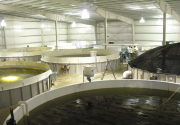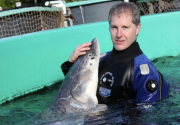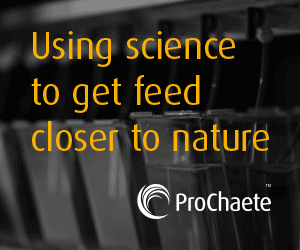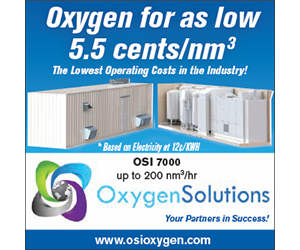| |
| |
 |
| |
 |
|
December 28, 2018 |
|
| |
 Apollo Aquaculture Group (AAG) in Singapore is building an eight-story RAS in the city-state in order to produce grouper and shrimp. The company hopes to be in full production with its new RAS by 2020.
» Read more
Apollo Aquaculture Group (AAG) in Singapore is building an eight-story RAS in the city-state in order to produce grouper and shrimp. The company hopes to be in full production with its new RAS by 2020.
» Read more
A 240,000-fish RAS hatchery is nearing completion at the University of Stirling with the promise of producing research-robust stock for use in future research projects across the United Kingdom.
» Read more
Octopus or tako, in Japanese, is a special ingredient in Japanese food culture. Amidst a growing global demand for octopus, scientists have been trying to rear the species from egg to export. Japanese seafood firm Nippon Suisan Kaisha, also known as Nissui, reported that it had successfully hatched over 100,000 eggs at its laboratory in the Oita Marine Biological Technology Center in Saeki city, Oita Prefecture, western Japan.
» Read more
|
| |
 |
| |
|
| |
 Recirculating aquaculture systems (RAS) technology development has been and continues to be a melding of borrowed engineering. Components of RAS originate from municipal and industrial wastewater treatment industries with applied research and development specifically on aquaculture technologies by academics in public and private institutions, as well as a little creative ingenuity provided by farmers, consultants and system suppliers.
This melding of technology has not always worked, but we are now seeing many more RAS facilities meeting their production goals.
» Read more
Recirculating aquaculture systems (RAS) technology development has been and continues to be a melding of borrowed engineering. Components of RAS originate from municipal and industrial wastewater treatment industries with applied research and development specifically on aquaculture technologies by academics in public and private institutions, as well as a little creative ingenuity provided by farmers, consultants and system suppliers.
This melding of technology has not always worked, but we are now seeing many more RAS facilities meeting their production goals.
» Read more |
| |
 A muddy off-flavour in fish is bad for business, and fish coming out of many RAS have off-flavour. The amount of off-flavour will vary with the system, water quality parameters, species and size of fish, and even individual variations. Wild fish from certain lakes and rivers also have this off-flavour. Consumers don’t want to eat fish with that flavour and they won’t likely buy it a second time. An even bigger problem is that they may stop buying that genre of fish altogether.
» Read more
A muddy off-flavour in fish is bad for business, and fish coming out of many RAS have off-flavour. The amount of off-flavour will vary with the system, water quality parameters, species and size of fish, and even individual variations. Wild fish from certain lakes and rivers also have this off-flavour. Consumers don’t want to eat fish with that flavour and they won’t likely buy it a second time. An even bigger problem is that they may stop buying that genre of fish altogether.
» Read more |
| |
|
| |
 With huge contributions to the livelihood, employment and food security of coastal communities in Nigeria, the fisheries sector is one of the country's most important. Amidst a high demand for quality catfish seed, one hatchery in Ughelli Delta State could have significant impacts on Nigeria's aquaculture.
» Read more
With huge contributions to the livelihood, employment and food security of coastal communities in Nigeria, the fisheries sector is one of the country's most important. Amidst a high demand for quality catfish seed, one hatchery in Ughelli Delta State could have significant impacts on Nigeria's aquaculture.
» Read more
Ideal Fish has officially opened its brand new land-based aquaponic facility in Waterbury, Connecticut, in the United States, spanning 63,000-sq-ft of recirculating aquaculture system (RAS).
» Read more
The new facility, to be constructed near Cape Town, will contain a hatchery, first feeding, fry, a pre-smolt unit, smolt and grow-out units and a purge system.
South Africa will soon be home to a new large-scale, land-based fish production facility that is expected to produce an initial 1,800 tonnes of trout per year, according to Danish construction firm Gråkjær.
» Read more
|
| |
|
| |

|
| |
| |







